America's Korean Adoptees, Part 4: Return To The Motherland
by Sarah Idzik
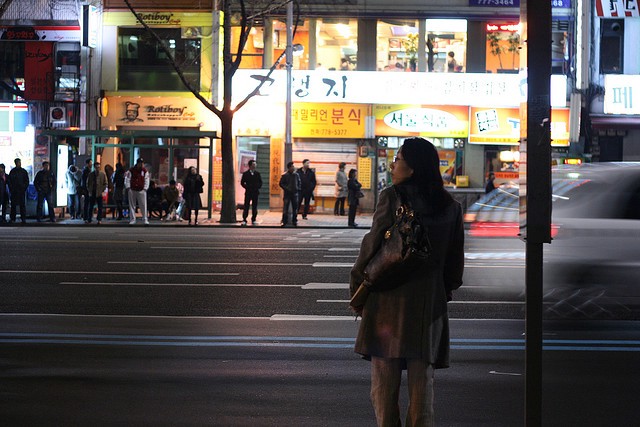
Mark, a 50-year-old Korean adoptee from Chicago, has an impressive display of facial hair: a full moustache and beard, something you don’t see that often on Korean men. (My brother, who, like me, is a Korean adoptee, has tried this before and gotten a woefully undergrown result.) When he was preparing for his first trip back to South Korea, Mark struggled with what to do about his facial hair. In homogenous Korean society, he knew that the beard would be “a big deal.” Should he make life easier and shave it, or stay true to himself and keep it? It was, as it turned out, a profound decision, one that would set the tone for his entire relationship with his birth country. So what did he do?
“I decided to keep my facial hair,” he said, “even though I knew it would be weird.” The result was much as he expected: “They stared at me constantly,” he said. “Everyone assumed I was Japanese.”
Not every adoptee chooses to return to his birth country for a visit, but such trips have become increasingly common in recent years. For many it’s an undeniable rite of passage — one that’s often difficult. Kathleen, a 24-year-old adoptee from upstate New York, described her trip back to Korea as “not a vacation. It feels like work.” Mark said, “It’s an intense experience” no matter how prepared you think you are. The first trip back for an adoptee is so much more than taking an east Asian sabbatical: it’s a point of no return. The decision to brave the journey is a choice to consciously confront the reality of your dual existence: an acknowledgment that despite your thoroughly American upbringing, this completely different world is somehow still tied to you.
“I came from this place. I spent the first six months of my life in this country, with these people, in these hospitals, eating this food,” Kathleen said of the realization she had during her trip. Eleana Kim, an aassistant professor of anthropology at the University of Rochester and author of Adopted Territory: Transnational Korean Adoptees and the Politics of Belonging, said that as an adoptee back in Korea for the first time, you often wonder “whether or not the people you’re passing on the street could be your relatives.” It can be, she said, “really destabilizing” to experience such a shock to “a life and an identity that was [previously] not questioned.”
At its best, the trip can help an adoptee piece together parts of a cultural identity that they may have felt was missing. As Caroline, a 24-year-old adoptee who teaches English in Korea, wrote me, it can fill in “a little bit of the hole that I think a lot of adoptees have.” Soo, who is also 24, remembers feeling “a little more mature” after her first trip back. Taken when she was ten years old, the trip gave her “a better understanding of where I came from.”
Paul Kim, who directs programs in Korea, Mongolia and Nepal for the adoption agency Holt International, explained to me that gaining more of an understanding of their birth country is an empowering experience that leads many adoptees to gain “a sense of understanding and pride, and a greater sense of self.” Holt operates Motherland Tours to Korea for adoptees, and Mr. Kim said that adoptees often contact Holt afterwards to ask about other opportunities to return to Korea.
Disconnection And Disillusionment
Cultural misunderstandings are a part of travel, but when you’re an adoptee in your birth country these issues are amplified. Take language. One of the first Korean phrases Heather, an adoptee from Baltimore, learned before her visit was “I don’t speak Korean.” Nobody believed her. And Caroline said that Koreans actually seemed to disapprove of her inability to speak the language.
Then there’s the sensation, sometimes as disconcerting as it is heady, of finding oneself a part of the majority. Ms. Kim described the process as having two stages: first, the relief at finally blending in, followed by the realization that “I can’t communicate with them. As soon as I open my mouth, they know I’m not one of them.”
The biggest source of disconnection comes from the responses of Koreans when they realize they’re talking to an adoptee. Envy is one facet: according to Ms. Kim, many Koreans envy adoptees because they were able to get on the “fast track to assimilation.” (Heather was told by some Koreans during her stay that she “was so lucky that I was adopted because my English was perfect.”)
Pity is also a common response. Steve, an adoptee from Nashville, said that while he didn’t feel shamed for his ignorance of the language and culture during his visit, “bringing up the adopted thing more often triggers a kind of pity response, which is awful in its own way.” Heather, who “actually had people apologize” to her for her adoption, knew adoptees who had gotten free meals or gifts from Koreans, perhaps because, she hypothesized, Korean cultural pride leads to collectivist Korean guilt. In fact, she rarely divulged her adoptee status because she “didn’t want them to feel sorry for me. I would occasionally get the pity face after I said that. And I hate that shit.”
Then there are the problems of cultural difference. Mark, my new, impressively bearded friend, found himself disillusioned by what he deemed a “really, really, really conformist” Korean culture. The facial hair, his Western appearance, the fact that he is gay, and his age — in his 40s for all three of his trips to Korea, well past the time he likely would have been married as a cultural Korean — all led him to being treated as an “outsider.” “I felt so alienated by Korea each time,” he said. “There is no space in South Korean culture for being different.” He described Koreans as determinedly uniform, both aesthetically — including the omnipresent double-eyelid surgery for women — and socially, an environment that makes it near impossible for adoptees to, as he put it, “get in.” He once met a Scandinavian adoptee who had done everything to fully assimilate in Korean culture, but Mark insists that the jig will be up when she gets a boyfriend and meets his family. “The family will reject her like that, because she’s an adoptee,” he said. He was also disappointed by what he perceived to be an intolerant and restrictive culture. “In Korea,” he told me, “[saying] ‘people will talk’ is like [saying] you boil babies and eat them for breakfast.”
Kathleen, who traveled with Mark on a 2006 tour with the Korean American Adoptee Adoptive Family Network (KAAN), met similar problems. Korean women are very thin, she told me, and at a healthy but non-size-two weight, she was subjected to a lot of unwanted attention. The worst moment was when an elderly man told her she needed to exercise during a tour of her adoption agency. “It was so incredibly offensive, and it was so hurtful,” she said, that she’s not sure when she wants to return to Korea, if at all.
Idealizing your birth country is a dangerous proposition for an adoptee, and coming up against its reality can lead to some painful revelations and disappointments. It’s hurtful to feel rejected by the hallowed country of your birth for simply being … well, you. “The real problem,” Steve said, “is when a place has symbolic value, and is nothing but a myth. When you idealize something so much without ever seeing it or experiencing it, that can be very dangerous.” When I confided that one of the factors preventing me from seriously contemplating visiting Korea was my fear that I just won’t like my own birth country, a somewhat traumatic idea for me, he said, “That would be healthy! I think I realized I could never live there. And that’s a good thing. That’s a kind of closure.” Though he wants to go back, he realized that he “can’t go back there and reclaim something that isn’t there to be reclaimed. And I had to go there to realize it wasn’t there.”
As for returning to Korea, Heather told me she “would go [back] in a heartbeat.” “It was seriously one of the best decisions I’ve ever made,” she said. But not all adoptees connect as strongly, or even at all, with their birth country: To Kathleen, Korea was “a huge, unwelcoming, foreign place” that effectively alienated her. While Kathleen and Mark recommend that every adoptee take the trip back to Korea, neither of them really wishes to return.
Meeting Your Birth Mother
Another major element often thrown into these already turbulent trips is the birth family search. This is a “huge question for many adoptees,” Mark told me. “Imagine the intensity, and then cube it.” It’s a major decision and, as Mr. Kim said, “a door that, once opened, you can’t close again.” How far are you willing to go? This isn’t just some long-lost or estranged relative: this is the woman who gave birth to you, who then, for whatever reason, gave you up for adoption. What would your life have been like with her if you’d never left? Who would you have become?
Understandably, plenty of adoptees decide they’re not ready. Mark is among them. “It might be really traumatic, you know?” he said. “People don’t just give up their babies for no reason.” Soo also decided against a birth family search and doesn’t regret it. Only ten when she made the trip, “I wouldn’t have fully grasped the gravity of making that choice.”
For Kathleen, her reunion with her birth mother was not quite the warm and happy meeting she had imagined. She had friends on the tour who had wonderful reunions with their birth mothers, and she found herself disappointed by the reality of her own encounter. Her mother was a no-show for their first scheduled meeting, and when they finally did meet up, “she was kind of a diva,” Kathleen said. And though presents weren’t expected, she had presented her birth mother with a gift and not received one in return. Basically, Kathleen said, “I didn’t particularly like her.”
But the door had been opened. Once Kathleen returned to the United States her birth mother started calling. Even though they couldn’t communicate because of the language barrier, she called every day for two weeks. Her family finally had to take the phone off the hook.
When Heather’s adoption agency contacted her while she was in Korea to say they had located her birth mother, she was stunned. “I couldn’t believe it,” she said. “I had honestly never expected to find her.” When they finally met at her adoption agency, “it was emotional. There was just so much sobbing. I had no idea what to expect, but it was a really positive experience.” Heather’s adoptive parents were even able to visit, meeting with her birth family for an emotional meal. The only thing that makes Heather sad is that her birth mother feels guilty about giving her up; her birth mother remarried, but, having given up Heather and her sister, she felt she “didn’t deserve any more” children. Heather told me that “there is certainly a sense of closure” now that she’s reunited with her birth mother, but that it also had raised a host of other questions. Before her birth mother had been an abstract concept. Now she has a real-life form.
Steve has never tried to meet his birth mother, and “basically has nothing to go on.” Do you wish you could? I asked. “Of course. In a way it’s easier to compartmentalize, because it’s a dead end. But yes, part of me will always wonder. How could you not?”
All Aboard The Orphan Bus
“Motherland tours.” The name sounds antiquated, even creepy, conjuring images of a state-sponsored journey through a falsely idyllic Korea, with scenes engineered to welcome long lost sons and daughters back into the fold. Yet while this is not an entirely false perception, the consensus among the adoptees I talked to was that if you want to travel back to Korea, a motherland tour is one of the best ways to do it.
A motherland tour typically consists of a large group of adoptees, with or without their families, traveling to Korea accompanied by staff and guides. It’s a package tour, and the itinerary usually includes visits to important sites and places of interests, with stops at adoption agencies and the possibility of a birth family search.
Tons of organizations run them, both in the United States and Korea, although the tours haven’t been around that long. Adoptees didn’t start going back to Korea in significant numbers until the early ’90s. Strangely, one reason for the increase in interest was a series of negative stories in the media scrutinizing the country’s adoption practices. During the 1988 Olympics in Seoul, NBC’s Bryant Gumbel reported on Korea’s baby “exportation” industry, claiming that the country’s babies were also its primary export commodity. The ethical questions surrounding Korean adoption received more attention with The Progressive’s unapologetically titled essay “Babies for sale. South Koreans make them, Americans buy them,” and a New York Times article published shortly thereafter, which characterized adoption in Korea as a well-run business — and a national source of shame for Korea. But even negative press brings heightened awareness. The first motherland tours catered mostly to adult adoptees, but over time, “tourism has evolved in response to customer demand, as it were,” said Ms. Kim. Nowadays, adoptees’ families, wanting to share the experience of a birth country visit with their children, are often the ones initiating the trips.
“It’s a very safe way to introduce adoptees who had never been to Korea to the place,” Ms. Kim said to me. She means “safe” in more than one sense. The tours provide logistical guidance, support, translation services and the comfort of traveling in numbers — all immensely valuable to anyone visiting a new country for the first time. But there’s another component as well. As Soo said to me, “These trips have the potential to get heavy,” and many adoptees value the emotional support found on a group tour. It means they’re not alone on the intense emotional rollercoaster that often marks the experience. “I purposefully went alone the first time,” Mark told me. “I wanted to see what it would be like. After I went, I was like, okay, I don’t need to go alone again.”
Of course, there are downsides. “The recurring complaint has been the sense of infantilizing and paternalism,” Ms. Kim said. On the first such tour that Ms. Kim (who is not an adoptee) accompanied, the group traveled on a bus with a huge banner identifying it as a being full of adoptees; the banner elicited so many responses of pity from onlookers that the group took to calling it the “orphan bus.” Mark told me a strikingly similar story of an adoptee friend on a tour whose bus bore a banner proclaiming it to be a bus of “Korean orphans.” Motherland tours have also been criticized “for being kind of unrealistic,” Ms. Kim added, and for “presenting a very limited view” of Korea.
Still, being a “bubble” has definite benefits. “One of the main things about these tours for adoptees,” Ms. Kim said, “is that the bubble [has] the positive effect of helping adoptees really bond with each other and develop these intimate exchanges about what it means to be adopted. In a way, the tour provides the space for that to happen.”
When adoptees return to their birth country, the collision of their two worlds can be confusing, chaotic, emotional, even traumatic. Sometimes they find closure, or connections, or lasting relationships. Or they very well may find that there’s nothing left in Korea for them to reclaim at all. But as Steve told me, “there’s something very powerful about just touching the ground you were born on.”
Previously: Part 1: What’s Your Name?
Part 2: When Adoption Became Visible
Part 3: Dating Inside And Out
Sarah Idzik is a writer living in Chicago.
Photo by redslmdr.
A Tree Grows
Through the miracle of time-lapse photography, some guy captured the transformation of an acorn into an oak tree. Or, at least, a baby oak tree. What do you call it, a sapling? I am not an dendrologist, so what do I know? Anyway, this seems remarkably reminiscent of the filmstrips they would show the children of the ’70s. It’s kind of trippy and chill or whatever. Enjoy. Maybe ponder the wonders of nature while you’re at it. Actually, just handle it however you want. I trust you.
The Secret to Not Wearing Socks with Shoes

A reader writes! “Since moving to New York, I seem to see a lot of bare feet in dress shoes. Is this a recent trend? Or a New York thing? In this heat, you’d think… that would make for some stinky shoes. I will occasionally go sans-socks if I’m wearing slip-ons or sneakers or going to the beach or something. but at the office? I don’t know… Where do you stand on this?”
Well, I’ll tell you where I stand. But it’s embarrassing. There are these tiny, tiny fake mini-socks. THEY ARE FOR MEN. REALLY. And I wear them all the time.
So, among other manufacturers, Calvin Klein makes something hilariously called Men’s Dress Shoe Cotton Liners. I know that sounds kind of like a maxipad. (There are similar products for ladies, obvs, both for the feet and for the boobs even too, kind of! But ladies know these things, so here I address the simpler sex.)
Do you want to be stank, boys? Here are things ladies don’t like: terrible breath, terrible manners and terrible stank feet. Also several dozen other things but I’m not allowed to tell you those.
And sure. You will never, ever, ever feel less like a man than when you put these on. Honestly you will feel a little like a lady!
But! This is why I don’t have stank feet and stank shoes but still look sockless! They won’t necessarily hold up through, like, a three-hour workout and eight hours in the office and a night on the town, particularly? But they will prevent Death By Foot in general. It’s worth it.
Or I guess I could just wear real socks but that seems so unsporting in late July.
The Horrors And Pleasures Of The Columbia House Music Club In Six Albums
by Michael H. Rowe
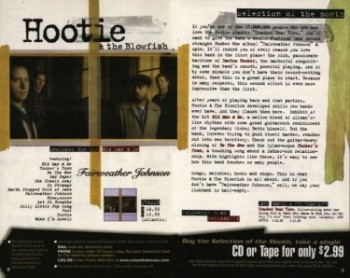
Nostalgia for the cultural touchstones of the 1990s, according to the Times, is a real-life, actual thing. Of course, they’re thinking in terms of Nickelodeon programs like “Doug” and “All That.” I would hasten to add that any good reminiscence of the pre-Lewinsky Clinton years requires a recognition that Columbia House Music Club was both a blessing and a curse for many a nascent music fan. It was for me. My membership fell somewhere between 1993 and 1996, pre-high school, pre-love of record stores. It was through Columbia House’s mail-order catalogs that I received all the Nirvana, Soundgarden and Belly albums I could get my hands on.
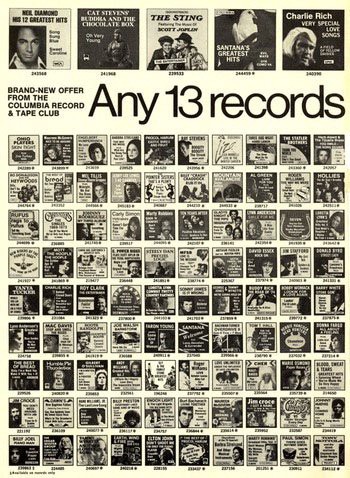
Of course, the club had been around for decades by the time I came aboard; from records through 8-tracks and cassettes to, by the time I joined, CDs. (It exists now only in a DVD incarnation.) During its reign, the Columbia House Music Club was, I’m fairly certain, instrumental in introducing several generations of American teens to the concept of anxiety. For those unfamiliar with the club, you signed up to get “12 CDs for the price of 1!” After that the setup required you to explicitly say no, every month, to certain CDs that would be sent by mail if you weren’t quick enough. The Federal Trade Commission calls this a Prenotification Negative Option Plan, which sounds like the name for an announcement in which you say, “I’d like to announce that I’m exercising my option to make no announcement.” You could order anything you liked from Columbia House, but there was always a stable of undesirables to avoid if you could — or accidentally keep and pay for if you forgot to mail back the form in time.
It was my first memorable encounter with anxiety, which now rules my life like an impeccably dressed dictator wearing nice sunglasses. By a certain date, I would have to say, “No, please do not send me Enya’s The Memory of Trees,” even if I knew nothing about Enya one way or the other. As a budding consumer, trying to learn how to BUY BUY BUY, I wasn’t properly equipped to say NO PLEASE GOD NO. And then, when that Enya CD finally came, I would have to spend a significant percentage of my total financial holdings on an album that I could not return. It was too much stress. I can clearly remember receiving, without realizing it would happen because I had not checked the right box, a number of heavy-metal CDs that I’ve long since misplaced.
Here are some albums that serve for me as reminders of the high and low points of the accidental consumerism that was “12 CDs for the price of 1.”
Candlebox — Candlebox

Obligatory. I still have this thing somewhere, but I never really listened to it. Honest! If I was going to caption this band photograph, it would read: “Hey, anyone wearing a surprisingly beautiful sweater — look over there!”
Deliverance — Corrosion of Conformity
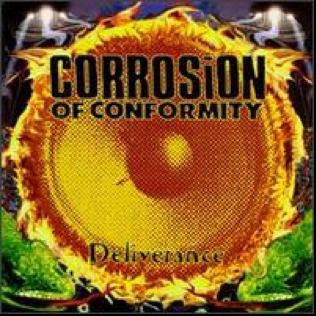
I remember there was a picture of the band in one of the Columbia House catalogs. They had long hair, but it was clearly not the flowingly sensitive, yet masculine hair of Candlebox. Corrosion of Conformity had metal hair. Looking at this cover, I remember noticing that an image of a speaker inside what appeared to be a sunflower framed by mirror-image lizards caressing it with their tongues was not really an obvious metaphor for anything and pretty cluttered, pictorially speaking. I didn’t actually use the word “pictorially” back then, though. And probably not “metaphor,” either.
Betty — Helmet

I didn’t buy this record, but given my musical interests at the time (and my cool acquaintances who recommended Betty), I think Helmet would have been a superb purchase. I wonder if the colorized look of this cover reminded me too much of the Smashing Pumpkins’ aesthetic circa Siamese Dream. As a young boy, though, I think the chasteness of the woman on the cover struck me as kind of wiener-y, like a class photo. Maybe I didn’t know what irony was. Sorry, Helmet.
Hints Allegations and Things Left Unsaid — Collective Soul
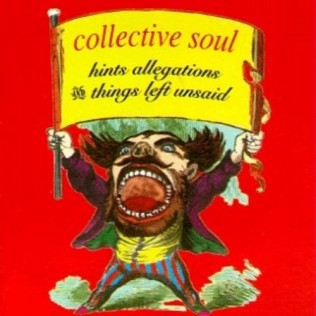
Simultaneously the greatest CD purchase of my early adolescence and proof that I still hadn’t conformed to the electrifying approval for Nirvana that seemed to rule among my grunge-oriented peers. When Collective Soul’s next album came out, I tried to play it at a youth group gathering at my church, but was denounced by a stern 15- or 16-year old girl who informed me that, while Collective Soul’s first album (the one above) was definitely Christian, their second album was not Jesus-approved. I remember feeling really offended. I mean, come on — that second album had that song about not committing suicide! She was clearly trying to kill me.
Slippery When Wet — Bon Jovi

My memories of the early- to mid-’90s are dominated by one overarching pop-culture theory: the ’80s sucked. Super uncool, according to all my peers. I remember that we thought this with real conviction. Regardless, when, at the age of 12 or 13, you’re offered 12 CDs for the price of 1, you realize pretty quickly that you don’t know shit about music, good or bad. So you pick Bon Jovi as filler; it’s a band name you recognize. Then you get the record and look at the album booklet’s pictures of attractive women wearing midriff-bearing t-shirts while washing cars — and then you realize the implications of the album title. And then you maybe feel a little uncomfortable, as though you’re holding something that could magically turn into forbidden pornography at any second.
Hungry for Stink — L7

Even at the time, I knew I wasn’t cool enough for this record. Sensitive 13-year-old boys who have just recently become aware that tucking turtlenecks into sweatpants looks awful are definitely not hungry for stink.
Related: Nostalgia Is Not New
Michael H. Rowe likes a couple Enya songs a lot, but still isn’t hungry for stink.
Anders Breivik, The American Tea Party, Norway and "Sharia Creep"
by Abe Sauer

The attacks were “a despicable act directed at everyone in Norway,” said Siv Jensen, the leader of the Norwegian Progress Party. While her assessment of the 76 dead and nearly 100 injured may be philosophically true, it’s technically false. The bombing and mass shooting late last week was in fact directed at a very specific group of Norwegians. These “summer camp” teens weren’t shot for taking canoe lessons; they were shot for being political activists, or children of such. (This was something made very clear by Tea Party leader Glenn Beck, when he functionally ended his corporate career days later by comparing the dead to Hitler Youth).
After years of ratcheted-up rhetoric, it was only a matter of time before some right-winger deduced to take what he saw as the natural next step. Still, it’s a surprise that Anders Breivik’s manifesto argues for creating “a cultural Euro-version of a Tea Party movement” — since one already exists. Norway’s Progress Party is a smaller-government, low-taxes, culturally conservative movement based on Christianity that, besides the diacritics, is nearly identical to the Tea Party. Breivik belonged to the party for some time. Progress Party leaders have made it a point to note that he left the party; Breivik himself still endorses the party in his 1,500-page diary, writing that he “strongly recommends followers extend their Facebook networks to like-minded individuals overseas and to, amongst others groups, join the Progress Party.”
The Progress Party is no lunatic fringe. In 2010, speaking on behalf of the Republican Party of the United States, then-Chairman Michael Steele sent a letter beginning “To My Friends at the Progress Party of Norway.” He wrote: “I look forward to your continued growth.”
Also in 2010, the head of U.S. Tea Party seed group Americans for Prosperity, Tim Phillips, addressed the Progress Party convention, cementing the relationship. It makes sense; the Progress Party is simply a populism movement and, despite all its rhetoric, that’s all America’s Tea Party is as well.
Phillips and Steele needn’t be embarrassed to have their associations with European extremists exposed. They regularly travel in the similar company of U.S. counterparts.
In America, it is becoming increasingly easy to find those like-minded individuals Breivik spoke of not just in the United States but also in the halls of power.
In March, Rep. Peter King held national hearings on the Muslim threat. Despite widespread criticisms, he announced that he would go ahead with a second June round, titled “The Threat of Muslim-American Radicalization in U.S. Prisons.” King is on record saying the nation has “too many mosques” and has addressed criticism thusly: “To back down would be a craven surrender to political correctness.”
For those obsessed with Islam, “political correctness” is a code word. Breivik constantly blamed political correctness as a weakness that would allow for Islamification. He wrote, “Multiculturalism (cultural Marxism/political correctness), as you might know, is the root cause of the ongoing Islamisation….”
Meanwhile, Michele Bachmann lashed out at critics for “applying a veneer of political correctness to national security,” calling King’s hearings “common sense.”
Bachmann has long cozied to anti-Muslim activists, understanding that the passion behind their single-issue support makes noise for candidates. As a presidential candidate, she signed the anti-Sharia pledge, which won her praise with the likes of bloggers like Robert Spencer, author of Jihad Watch, a blog cited numerous times by Breivik as inspirational.
One of the American anti-Muslim crusaders Bachmann partners with is Minnesota “punk preacher” and radio host Bradlee Dean. Dean is no mere nut — in addition to Bachmann, Dean’s ministry has ties with Tim Pawlenty and Tom Emmer, the Tea Party candidate for governor who lost by a hair.
In May of this year, Bradlee Dean gave the opening prayer for the Minnesota House of Representatives. During his address, Dean, long having hinted that Obama is a Muslim, praised all denominations of Christianity, and said: “The head of the denomination is Jesus as every President up until 2008 has acknowledged, in Jesus’ name.”
When Rep. Keith Ellison, the first Muslim to serve in Congress, took issue with the address, Dean took to his radio show in reply: “What is it you don’t like about who we are, Keith? Our laws say no to Sharia law in this country. Is this your problem?” It wasn’t his first scrap with Ellison. In 2010, Dean said, “There is a correlation between the Muslims and the homosexual agenda, and we have a couple of fools in the state of Minnesota that are putting a rope around their neck and they just don’t realize it.”
Speaking of Obama: Those who argue that Breivik’s politics were those of the EU, and not of America’s Tea Party, will have a hard time explaining why the shooter featured Photoshopped anti-Obama imagery in his video opus. And in his manifesto, Breivik ranted about the “War on Christmas.”
Compare Breivik’s now-famous sole tweet, the paraphrased Mill quote (“One person with a belief is equal to the force of 100 000 who have only interests”), to, say, the Adams quote on TeaPartyGroundZero.com: “It does not require a majority to prevail, but rather an irate, tireless minority keen to set brush fires in people’s minds.”

And for those familiar with the Tea Party, seeing Breivik posture with his firearm was a familiar sight.

When it comes to national leaders, Bachmann and King are hardly the only ones flirting with the anti-Muslim crowd. Herman Cain caused a stir when, citing Sharia law, he said he would only hire Muslims if they swore a loyalty oath.
Then, at the conservative conference RightOnline, Herman Cain defended his statements by saying, “There is this creeping attempt, there is this attempt to gradually ease Sharia law and the Muslim faith into our government… This is what happened in Europe. And little by little, to try and be politically correct, they made this little change, they made this little change. And now they’ve got a social problem that they don’t know what to do with hardly.”
For those looking for it, “creeping Sharia” can be found anywhere. “Sharia creep” is a favorite term of Michelle Malkin — herself a religious fundamentalist who sought to live amongst the like-minded in Colorado Springs, a city that’s become a “mecca” for Evangelicals.
American Sharia creepers may even be having an impact on American business (our “job creators”). In June, American bloggers created a headache for Delta when they concocted a conspiracy theory about the airline’s partnership with Saudi Arabian Air and their “discrimination against Jews.” Soon, Delta was being plastered with comments from ignorant people under the spell of racist paranoids. One commenter wrote, “I will not be flying Delta Airlines again. Your silly excuse is sickening. You should refuse to enter any relationship with any county in which it is illegal to carry a Bible openly. You make me sick!”
Sharia creep is just one more item of proof that the EU nationalists and American Tea Party right-wings are speaking the same language (even when they’re not speaking the same language). When Progress Party leader Siv Jensen warned about the Islamic threat, she used the term “snikislamisering” — “sneaking Islam.”
A proven influence on Breivik were American anti-Jihadists and Sharia creepers Robert Spencer and Pamela Geller. (Spencer is the author of the books The Truth About Muhammad and The Politically Incorrect Guide to Islam.) In an age when everyone laments American’s distaste for reading, both of those books made the New York Times Bestseller list. Spencer often writes about Obama’s partiality for Islam, such as his ties to the Islamic Brotherhood.
Pamela Geller authors the blog Atlas Shrugged, where she rails against Sharia creep. She is a regular marquee speaker at Tea Party events. In his manifesto, Breivik recommended both Geller and Spencer for guidance.
Those two are among numerous right wing and Tea Party bloggers who sound the same alarm — many of whom see putting “infidel” in Arabic on their sidebars as heights of intellectual counterpoint.
Even more mainstream writers are tied to the populist vilification of Islam. The National Review now regularly partners with the topic, as its reader base longs for more information on the impending threat of America’s Islamification. National Review writer Andrew McCarthy put his name on a book called “Shariah: The Threat to America.”
The scaremongering is paying off both in votes and legislation. Tennessee and Oklahoma now both outlaw Sharia law. In Tennessee, the law even defines Sharia as “a legal-political-military doctrinal system.” Lawmakers said the bill was necessary to prevent “homegrown terror,” which would be funny today if it were not tragic.
At least ten other states are currently considering similar laws.
Then there are the anti-mosque movements. New York, most famously, but so many other states have seen them now, like Florida and Wisconsin. In North Dakota, the webpage of a planned mosque features comments such as “A mosque was not welcome by ground zero & is surely not welcome here” and “shariah laws are trying to change our country. Look what you’ve done to France and England!!! India is no longer allowed to practice their faith due to muslims.”
Ross, North Dakota, is the site of the first recorded mosque in the United States.
With all of this noise, one would expect to find Muslims coming out of America’s ears. The very highest estimates of Muslims in the U.S. top out at 2 percent of the American population. (Estimates range from 1.3 million to 7 million, with a 2011 Pew Forum on Religion & Public Life study finding that Muslims make up less than 1 percent of the U.S. population today (2.6 million) and that by 2030, 20 years from now, they will still only account for 1.7 percent of the nation’s population.)
The anti-Muslim sentiment that in its extreme bred Norway’s shooter has only manifested so far in the U.S. in individual assaults and community “incidents” — such as the one in February in Yorba Linda, California, where a Muslim relief organization with perceived ties to terrorism was protested by attendees waving American flags and yelling “terrorist go home” to women and children.
Lost on nobody, in condemning the acts, right wing radicals in the U.S. and Norway sounded exactly like the Muslim community they so suspect — “We never advocate violence” is parroted by many, who then blame violent acts on lone, misled members of their ideology. (Familiar story.)
This is to be expected from a populist movement completely barren of self-awareness. In his comparison of Norway’s dead to the Hitler Youth movement, Beck asked, “Who does a camp for kids that’s all about politics? Disturbing.” Well, in July, the Tea Party 9/12 Project offered a summer camp for kids ages 8–12 where they learned about socialism, the gold standard and the Constitution, among other things. In 2009, Beck was an early champion of the 9/12 movement, writing, “Become a 9/12er and don’t be afraid of it.” (Beck got what he wanted though, attention, in the form of legitimizing criticism from Al-Jazeera that compared the talking head to al-Qaeda.)
Undeterred from continuing to churn the butter that makes their bread tasty, Sharia creepers vowed to be undaunted by the events. After jumping to condemn Islam and jihad for the attacks in Norway, Michelle Malkin wrote that she would offer “no apology” and “I will continue to be vigilant in thoroughly covering the global jihadist threat.” Like many other Sharia creepers, Malkin defended herself by saying that “reading the signs and connecting several large, obvious dots,” the event “definitely suggested jihad.” Malkin was finally right, it was jihad.
Abe Sauer can be reached at abesauer at gmail dot com. He is on Twitter.
Amy Winehouse: An Observation
“A gift to gossip writers, Winehouse was nonetheless famous for actually being good at something. She was retro even in her celebrity; one of the most exposed in a culture of unprecedented over-exposure, she still appeared mysterious, as if she was disguised as herself…. She looked as if everything had already happened to her.”
Cosplay Both More, Less Perverse When It Involves Bowties
Cosplay Both More, Less Perverse When It Involves Bowties

Well, here are the Doctor Who Lookalike Contest Winners from Comic-Con. Not very lookalikey but I give them credit. And here’s everyone else who entered: kind of want to hug them all. Some way more tightly than others. What a sexy zoo. (Just me?)
The Ten Worst Augusts of the Last Ten Years
by Matt Langer

Anyone who lands his or her first desk job very quickly learns the three most important lessons about desk jobs: 1) the best thing about desk jobs is the Internet; 2) the harder one works at his desk job the faster he’ll climb the corporate ladder (therefore the sooner he’ll land a desk where nobody can see his screen); and 3) alt-tab is your friend!
But nowhere in the employee training manual does it say a word about how insufferable the Internet becomes in August — and it really should! Because year after year, the entire workforce endures a month-long occupational hazard as it dutifully tries to go about its day-to-day work of having a desk job and going on the Internet, and that’s because year after year the media cooks up a single infuriatingly awful storyline to spend the entire month hammering away at until everyone has gone completely mad. And yet even despite the clockwork regularity with which the Internet goes crazy the workers of the world still manage to never see August coming until August has already sneaked up from behind and shouted “Hi! We’ll now be spending the next thirty-one days freaking out about the 9/11 Ground Zero Terror Mosque!”
Now why is August so awful? Nobody knows! Could be that a few months of stifling heat have finally taken their toll, or it could be that the congressional recess leaves a gaping hole in the 24-hour news cycle that has to be filled by something. Could also be because all the rational, sensible people (and their psychiatrists) are away on vacation. But this much is certain: August has always been awful, August will always be awful, and somehow — paradoxically — every August manages to be even worse than the last. So as August again fast approaches and a brave nation steels itself against the impending onslaught, it’s wise to take a solemn look back at a decade of terrible Augusts.
From this history, we can take two more very important lessons about desk jobs: 1) come Labor Day everyone will fondly look back at the formal announcement of the presidential candidacy of Sarah Palin as being some of the better news the month had to offer; and 2) actually, close-tab is your friend!
Terrible Things That Happened in August, 2001

Bayer tried to kill everyone with a deadly cholesterol drug; Mayor Giuliani’s “Decency Panel” tried to rid New York City’s museums of boobs; a group of crazy congressmen trotted out the human cloning bogeyman and gave President Bush the space he needed to look like a moderate when he banned stem cell research; Aaliyah died; George Bush apparently slept through a rather important morning meeting on August 6th on the subject of “Bin Laden determined to strike in US.”
What We Paid Attention To Instead

Gary Condit was battling for his political life four months after the disappearance of Chandra Levy, a Washington intern from Condit’s home district. In a widely anticipated interview with Connie Chung in late August, Condit bobbed and weaved his way through the interview before finally confessing he and Levy had been “very close.” Yet despite all the attention he received, Condit was never implicated by police in Levy’s disappearance, and just a few weeks later he had completely vanished from the public spotlight following the World Trade Center attacks. He would spend another three years in Congress, earning himself no other distinction besides being the only guy who didn’t vote to convict the really very corrupt Ohio congressman James Traficant.
Terrible Things That Happened in August, 2002

The Senate killed prescription drug benefits for Medicare; a steady torrent of new revelations emerged about multi-billion dollar accounting fraud at Enron, WorldCom, Adelphia, and Qwest; Arthur Anderson collapsed; the stock market tanked; baseball tried really hard to go on strike again.
What We Paid Attention To Instead
The White House had already spent months steadily ramping up its rhetoric on Iraq, but Dick Cheney took it to the next level during a speech at a VFW convention when he claimed Saddam Hussein was “fairly close” to a nuclear weapon. “The risks of inaction were greater than the risks of action,” he said, and by the end of the month that rationale had morphed into one of the war’s most unforgettable memes: “We don’t want the smoking gun to be a mushroom cloud.”
Terrible Things That Happened in August, 2003

A devastating car bomb killed scores at a Marriott hotel in Jakarta; a number of dioceses voted to split from the Episcopal Church because of a gay bishop; Mel Gibson started screening The Passion of the Christ; 45 million people across the Northeast were affected by the worst blackout in US history.
What We Paid Attention To Instead
The recall election of California governor Gray Davis had long since become a political punchline after more than a hundred candidates joined the fray — including child actor Gary Coleman and the porn star Mary Carey — but the race descended into utter farce in August upon the entry of Arnold Schwarzenegger and (wait for it) Arianna Huffington. (True story!)
Terrible Things That Happened in August, 2004

Roughly four hundred U.S. states passed ballot measures banning gay marriage (okay, 13, to be exact); Hurricane Charley, the strongest storm to hit the US since Andrew, made landfall in Florida (to a total cost of $15.4 billion); Julia Child died; Time magazine reporter Matthew Cooper was held in contempt of court in the ongoing investigation into the outing of CIA operative Valerie Plame; New Jersey governor Jim McGreevey famously told the nation he was a “gay American”; the entire Republican party descended upon New York City to renominate George Bush from as close as humanly possible to Ground Zero.
What We Paid Attention To Instead
Three television ads were aired by an elusive political action committee making the claim that presidential candidate John Kerry, a veteran of the Vietnam war, had distorted his service record and later dishonored his country when he ultimately returned home and protested the war. That these ads were patently false didn’t stop the media from obsessing over the Swift Boat Veterans for Truth, and it was apparently without a single ounce of self-awareness that by the time of the next election cycle rolled around — a mere two years later — these very same media personalities who had helped parrot these lies in the first place unironically adopted the phrase “swiftboating.”
Terrible Things That Happened in August, 2005
George Bush bypassed the Senate to send John Bolton to the United Nations by way of a recess appointment (despite the fact that John Bolton didn’t even very much like the United Nations); the President formally endorsed intelligent design, expressing his desire to see it taught in public schools; the Israeli withdrawal from the Gaza Strip and the West Bank didn’t exactly go well; one of Tom DeLay’s “oldest and dearest friends,” Jack Abramoff, was indicted on wire fraud charges; U.S. forces endured their highest monthly casualty rate of the four years in Afghanistan; a crazy person named Jean Schmidt won a hotly contested congressional special election in Ohio; a crazy person named Mahmoud Ahmadinejad won the presidential election in Iran; George Bush vacationed in Crawford while a category 3 hurricane named Katrina hit the Gulf Coast, killing more than 1,800 people, causing more than $80 billion in damage and dislocating over a million residents.
What We Paid Attention To Instead

On August 3rd, the grieving mother of a dead soldier pitched a tent outside President Bush’s ranch in Crawford, TX, and promised to sit patiently for the entirety of the President’s five-week vacation until the latter afforded her a (second) meeting on the question of why her son Casey had died in Iraq. The media became quickly enamored of Cindy Sheehan and her demonstration at the newly dubbed “Camp Casey,” while war supporters responded by setting up a competing camp — and the Washington press corps spent the rest of the month filing live televised segments in khaki cargo shorts.
Terrible Things That Happened in August, 2006

Israel and Lebanon went to war; Joe Lieberman lost the Connecticut Democratic primary to Ned Lamont before becoming the founding member of the upstart Connecticut For Lieberman party; Mel Gibson had a few too many drinks and got a few things off his chest about the Jews; the solar system lost a planet after Pluto was demoted to a “trans-Neptunian object”; news continued to break following Dana Priest’s Pulitzer-winning reporting earlier in the year on the CIA’s secret prison camps until the President ultimately acknowledged the US practice of “extraordinary rendition”; everyone almost died of the bird flu.
What We Paid Attention To Instead
Twenty-four people were arrested in a series of nighttime raids in London on August 9th, and the United States promptly went “red” on the color-coded threat level scale after Tony Blair triumphantly foiled “the greatest terrorist plot since 9/11.” The suspects were said to be planning to bring down “ten to fifteen” transatlantic flights using liquid explosives disguised as bottles of Gatorade. Reports later emerged that the extent of the plot’s threat had been wildly overblown (the British government preferred the phrase “speculative and exaggerated”), but nonetheless, the TSA still requests that you kindly limit your travel toiletries to 3.4 ounces.
Terrible Things That Happened in August, 2007
A bridge collapsed during rush hour in Minneapolis, killing 13 and injuring 145 more; Michael Vick pleaded guilty to being a horrible, horrible person; Karl Rove finally went away; New York couldn’t get it together fast enough to legalize gay marriage before Iowa did; China tried to kill all of our children with poisonous toys; a thoroughly juiced Barry Bonds surpassed Hank Aaron’s home run record; Congress approved President Bush’s request to expand warrantless wiretapping; economists started talking about this thing they were calling the “sub-prime mortgage crisis.”
What We Paid Attention To Instead

Idaho Congressman Larry Craig was arrested at the Minneapolis-St. Paul international airport on a disorderly conduct charge all the way back in June, but it wasn’t until August that Craig entered a guilty plea and news finally broke that the Senator’s “disorderly conduct” was something more along the lines of “attempting to solicit sex in a public place.” Other facts slowly trickled out as well, including the fact that the Senator’s first response to his arrest was to present the officer with his official US Senate business card and ask “What do you think of that?” But of course the key ingredient that sent an otherwise run-of-the-mill political sex scandal into the media stratosphere was the fact that Senator Craig — who during his first term had been one of the chief architects of “Don’t Ask, Don’t Tell” — had been caught soliciting sex of the gay variety. The senator was quick to assure constituents (and other Republicans) that “I am not gay, I never have been gay,” and he swore he wasn’t using any coded pick-up signals but that he merely had “a wide stance.” Craig announced his resignation on September 1.
Terrible Things That Happened in August, 2008
Russia and Georgia went to war; Facebook launched “Beacon”; unemployment rose to its highest level in four years; total U.S. military deaths in Afghanistan surpassed 500; the FBI brought charges in its seven-year-long anthrax investigation; the government readied a multi-billion dollar bailout for Fannie and Freddie; John McCain introduced Americans to an obscure Alaskan governor named Sarah Palin.
What We Paid Attention To Instead

The National Enquirer broke the story in late 2007, but it wasn’t until August 8 that former North Carolina senator and two-time presidential candidate John Edwards admitted to having an extra-marital affair with a campaign worker. There was also a love child! Which means the media unfortunately ended up spilling far more ink over the “former Vice presidential nominee had affair, love child” angle and not nearly as much about the whole “cheating on a lovely wife who at the time was terminally ill and battling breast cancer.” thing. John Edwards tried using illegal campaign donations to cover up his mistress, and he currently faces up to 30 years in prison and a $1.5 million fine after a recent indictment on six felony charges for doing so.
Terrible Things That Happened in August, 2009
The US announced a projected $1.6 trillion budget deficit, the highest ever on record; pirates attacked off the coast of Somalia; the Los Angeles county coroner’s office declared Michael Jackson’s death a homicide; John Hughes died; Ted Kennedy died; Eunice Kennedy Shriver died; Don Hewitt died; Les Paul died; everyone else almost died of H1N1.
What We Paid Attention To Instead

With Congress out of session and 535 senators and representatives headed to their home districts, the President and Congressional Democrats tried to mobilize a counter-offensive to the insurance industry’s lobbying efforts with a series of town halls. Their plan to educate Americans about healthcare reform spectacularly backfired, however, when healthcare opponents were the first ones to get around to educating Americans about a secret clause in the proposed legislation that would mandate a series of shadowy, government-run “death panels” intended to kill all of our grandparents. Television viewers were hard-pressed to find a single nightly news broadcast during the entire month of August that didn’t feature footage of an angry mob screaming at a congressman.
Terrible Things That Happened in August, 2010

Thirty-three miners were trapped for 69 days in a Chilean copper mine; 2,000 people died in a series of devastating floods in Pakistan; Wikileaks released the “Afghan War Diary”; Pfc. Bradley Manning was thrown into solitary confinement; a jury found former Illinois governor Rod Blagojevich not guilty on 23 of 24 criminal counts in a federal corruption trial; journalists spent a lot of time discussing Chelsea Clinton’s wedding; journalists spent a lot of time discussing Bristol Palin and Levi Johnston’s wedding; journalists spent a lot of time trying to figure out whether or not Supreme Court nominee Elena Kagan was a lesbian.
What We Paid Attention To Instead
The longest, hottest, most insufferable August of the decade began when all eyes turned to an abandoned Burlington Coat Factory building in lower Manhattan. This (newly recognized) historic landmark was to be demolished and a community center was set to go up in its place. Building permits had already been issued by the New York City planning board, however, when the community center’s true intentions finally came to light, and so the rest of the country valiantly rushed to New York’s defense against The Great Muslim Menace that sought to Dance On The Grave Of Every 9/11 Victim by building a Victory Terror Mosque At Ground Zero. Pamela Gellar even organized a march! And protesters came from far and wide (Kansas, mostly). And it was the worst August any of us have ever lived through.
Matt Langer doesn’t think it’s a coincidence that the U.S. is likely to default on its debt on August 2nd, 2011.
These Are People Who Died (At An Age Other Than 27)
As it turns out, some musicians don’t die at 27. They die at other ages. Little known fact! [Via]
